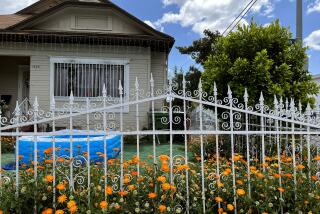When home security looks like siege mentality : Bullet-resistant siding for residences is now available. Interest in the product is intense, but some wonder if it signals a surrender to crime.
- Share via
SAN ANTONIO — Scott Shaheen and Alan Sharp never expected such a demand for their new fiberglass wallboard siding, which they claim is strong enough to withstand a bullet.
Dozens of calls came in from people living in high-crime areas in Los Angeles, where drive-by shootings are reported with tragic regularity.
Rural residents in Ohio wanted protection from stray bullets fired by hunters. In the Tornado Belt, people were looking for relief from flying debris that could damage their homes.
In areas like California that are prone to earthquakes, people wanted reinforcement for their hallways and doors. And in the Midwest, one lady living next to a golf course asked for protection from errant golf balls.
With so many orders coming in for a product that was started as a good-neighbor attempt to protect San Antonio residents from drive-by shootings, Shaheen and Sharp--two building contractors and longtime friends--may have stumbled onto something that could dramatically change the way a lot of people live.
While trying to make homes safe from gunfire and other elements, experts said, the new Bullet Resistant Systems Ltd. company could also have the effect of making people prisoners in their own homes. In an era when there are already security cameras in shopping malls, burglar alarms on cars and, in New York, bulletproof clothing for schoolchildren, this could be yet another sign of a society giving in to the criminal element.
“We don’t know where this thing is going to lead us,” conceded Sharp. “But we do know that everybody seems to want it.”
They hit on the idea after attending a Neighborhood Watch meeting.
In San Antonio, with white, black, Latino--even cowboy--gangs on the rise, where police said there were 1,262 drive-by shootings last year, where recently a young girl was shot on her living room couch and another child was hit in his bedroom, some residents had had enough.
The meeting was held in an affluent part of town, where a few gang members had recently moved in to new federally financed housing projects next door.
“The homeowners were scared to death,” Shaheen recalled.
To ease their fears, Sharp and Shaheen developed a half-inch-thick material that for roughly $4,000 or more will cover the inside of your walls, doors, roof and garage, and for additional protection, sliding panels that cover the windows at night. The product is similar to aluminum siding, only it is bullet-resistant. They call it “Safe Shield.”
In fact, according to the two entrepreneurs, a customer can order the material tough enough to stop bullets from a .38-caliber special, a .357 magnum, even a semiautomatic rifle.
“You’re buying a level of protection,” Shaheen said. “You’re buying what you think you need for a war zone when they attack your house.”
To demonstrate their product, they invited the San Antonio police gang and bomb squads for a test-firing earlier this year. At a local gun range, the police threw a large amount of firepower at the mock panels set up to resemble the front of two homes. When the smoke cleared, the panels had withstood the test.
“We put hundreds and hundreds of bullets into this thing and nothing got through,” Sharp said.
The police here decline to discuss the product’s worthiness. They said that as a matter of policy, they do not endorse for-profit enterprises. But Hubert Williams, director of the Police Foundation in Washington, said that there are several reasons why a police department may not want to sign on to a commercial venture.
He said the product could eventually become defective and lead to legal responsibility for the police. He said criminals could get their hands on the material and some day use it to barricade themselves in drug houses or for other reasons. And, perhaps most important, by endorsing the product, police could be sending a message to their community that the gangs have won.
“It’s unfortunate that we have come to the point in our cities where some children have to wear bulletproof clothing and other people are considering bulletproof veneer to protect their property,” Williams said.
“But in our society anything that makes money goes.”
Only one San Antonio home has been fortified thus far, and the media attention from that venture left Sharp and Shaheen deluged with inquiries from individuals and home builders around the country. They now plan to put together a marketing strategy where they would franchise the know-how and materials to subcontractors.
And while acknowledging that it could be seen as a big money-maker, they said their primary intention is to produce something that can help others.
“First, people began buying back-yard floodlights,” Sharp said. “Then it was security alarms and then burglar-bars on their windows. Some people nowadays just don’t feel safe at home anymore.”
More to Read
Sign up for Essential California
The most important California stories and recommendations in your inbox every morning.
You may occasionally receive promotional content from the Los Angeles Times.














